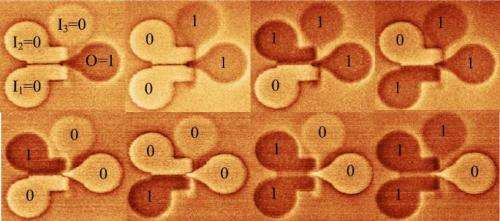August 11, 2014 report
Best of Last Week – First 3D magnetic logic gate, water tractor beam and charging phones wirelessly

(Phys.org) —It was a busy week for applied physics as Researchers build first 3D magnetic logic gate—they used programmable 3D nano-sized magnets to build the gate–it could lead to circuit chips with increased density. And speaking of circuit chips; Tiny chip mimics brain, delivers supercomputer speed. A collaborative effort has led to the development of a "neurosynaptic" chip, its makers claim, and it works by using processes that mimic the human brain. Because the chip, named TrueNorth uses a neural design it is able to process data on par with a supercomputer, opening the door for such uses as driverless vehicles that don't have to rely on communications with a more powerful remote computer to get around. In related news, neuroscientists are zeroing in on The fastest neurons in the brain, aka "fast-spiking parvalbumin-positive interneurons." Perhaps their findings will lead to an even faster neurosynaptic chip.
Also, Physicists create water tractor beam—a team at The Australian National University found they could use wave generation to move objects sitting on the surface of a liquid. That could come in handy for managing ships in tight quarters, or perhaps to help move floating drones. Also, smartphone users can start holding their breath: Charging with ultrasound: uBeam has functional prototype—it's a wireless charging platform that uses ultrasound to send electricity to devices through the air to charge portable electronics. They hope to have a product ready sometime in the next two years.
In biology news, Scientists create purple-winged butterflies in six generations using nothing but selective breeding. All they had to do was measure the ultraviolet reflectivity of moth wings and breed those with the color closest to purple, a process the researchers believe could be replicated when designing devices that trap light, tune color or steer light beam. Also, Flores bones show features of Down syndrome, not a new 'hobbit' human.
And finally, if you're wondering if you're perhaps a little too into yourself, you can find out, as a team of researchers has discovered that Just one simple question can identify narcissistic people. Turns out, all they had to do was ask them, which suggests, you could do the same.
© 2014 Phys.org




















